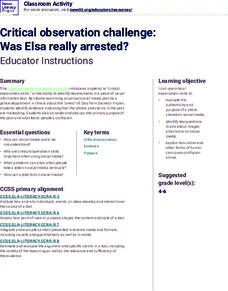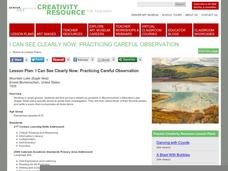Chicago Botanic Garden
Recognizing Change (Observation vs. Inference)
What is the difference between making inferences and making observations? Young climatologists refer to a PowerPoint to make observations on each slide. They record their observations in a provided worksheet before drawing a...
Howard Hughes Medical Institute
Gorongosa: Making Observations Activity
Do you have young scientists wanting to make new discoveries rather than just completing the same experiments? Young scientists use their observational skills to identify animals and patterns in animal behavior. Through tracking...
Bonneville
Making Observations and Recording Data for Solar Powered Water Pumping
Get pumped about an activity with water pumps. The fifth of seven installments in the Understanding Science and Engineering unit has pupils learn how to make observations, record data, and create data displays. Each group measures the...
Royal Society of Chemistry
Observing Chemical Changes—Microscale Chemistry
Want to add a wow factor to your current chemical changes lesson plan? Try a microscale experiment with colorful precipitates! Partnered learners conduct 10 single displacement reactions and record their observations.
Bethel School District
Observations and Inference
What's the difference between qualitative and quantitative observations? Learners make observations, inferences, and predictions about their environment with a set of questions and activities that are applicable to either language...
Curated OER
Lesson Plan: Blending Observation and Imagination
Upper graders analyze the work, Bouquet of Flowers in a Vase by Maria van Oosterwyck. They consider the value of her paintings and how they are still relevent and sought after, 350 years after they were created. The blending of...
Perkins School for the Blind
The Mystery Box - Making Observations and Collecting Data
Making observations and collecting qualitative and quantitative data is a vital skill all scientists need to practice. Help your scientists with partial and no sight learn how to use their other senses to make observations for...
Freeology
Nature Observations Journal
A journal template makes observing nature a breeze. Super scientists identify an interesting object in nature, draw it, list its details, and compose a written descriptions of their artwork.
Washington Office of Superintendent of Public Instruction
Using Our Senses to Observe
Look around and explore. Little ones use their five senses with some day-to-day activities designed to guide observation and apply STEM strategies. Young scientists learn through comparing/contrasting and...
University of Colorado
Strange New Planet
The first remote sensors were people in hot air balloons taking photographs of Earth to make maps. Expose middle school learners to space exploration with the use of remote sensing. Groups explore and make observations of a new...
Curated OER
Perception and Observation
Students use common and unusual objects to make observations of details, design, and functionality. They describe and draw each object while working in small groups. The differences between observation and perception is covered as part...
Ohio Department of Education
Observe Then Infer
To develop their skill at drawing inferences from observations, sixth graders rotate through six stations, conduct a series of experiments, make observations, and draw inference from what they observe.
Curated OER
Observation and Inference
Assess your young scientists' understanding of the difference between observation and inference with this 20-question multiple choice quiz. It reviews a variety of physics and astronomy concepts, such as solar eclipses and sunspots, the...
American Psychological Association
Counting Fidgets: Teaching the Complexity of Naturalistic Observation
Why do psychologists conduct experiments in controlled laboratory settings? High schoolers gain an understanding of the importance of controls with an activity that involves naturalistic observations with no imposed controls.
Do2Learn
Teacher Observation Sheet
Collect anecdotal data using a teacher observation worksheet that looks closely at scholars' behavior, their triggers, the behavior's frequency, duration, and setting.
News Literacy Project
Critical Observation Challenge: Was Elsa Really Arrested?
A 14-slide presentation showcases a social media post featuring Disney's Elsa from the movie, Frozen. The seemingly harmless post received lots of attention, raising the question, how do we know posts are factual? Scholars go through...
Curated OER
Riding on a Pendulum
A comprehensive resource gets fourth grade physical scientists making observations about the period of a pendulum and then applying knowledge to a playground swing. Through seven different stations, they will record observations and...
Curated OER
Lesson: I Can See Clearly Now Practicing Careful Observation
Poetry and art analysis go hand-in-hand. In groups, youngsters analyze a landscape painting, making careful observations. They use details found in the painting to inspire an original poem. The poem must include at least three objects...
Curated OER
Close Observation: Coins
Integrate math, science, and speaking/listening with a collaborative hands-on activity. Each group works with a single penny, examining it with the naked eye and recording observations. Repeat using magnifying glasses. Then repeat with a...
Curated OER
Observation Science
In this making observations in science worksheet, students experiment with whole milk in a pie tin with added food color. They make observations and then add a toothpick with soap on the end to the middle of the tin. They make...
Curated OER
ACTIVITY 6: MAKE A FOSSIL MOLD AND CAST and ACTIVITY 7: HOW BIG WERE PREHISTORIC ANIMALS?
Instructions for two terrific ancient history lessons for your primary paleontologists are provided in this resource. The first involves the creation of fossil cast replicas using plaster of Paris. The directions are detailed, but the...
ReadWriteThink
Webcams in the Classroom: Animal Inquiry and Observation
Boost observational skills with an inquiry-based lesson that takes scholars on a virtual field trip. With help from webcams, learners observe animals in a zoo or aquarium. Observations go into a journal and a discussion is held to review...
American Physiological Society
Did I Observe it or Infer it?
Take the mystery out of inquiry! When young scientists learn to use their keen powers of observation to make smart inferences about a situation, they are well on their way to understanding what the scientific method is all...
California Academy of Science
What's on a Penny?
As a lesson on scientific observation, have your class investigate the features of a penny and a nickel. Working in pairs, they practice writing detailed descriptions using their senses and a ruler to gather information. This is an...
Other popular searches
- Making Observations Science
- Making Observations Biology
- Ell Making Observations
- Making Observations in Science
- Ell + Making Observations

























